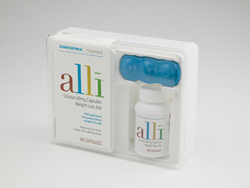 |
Drug tampering not only poses threats to consumers but is also disruptive and expensive for drugmakers, forcing recalls and sometimes undercutting brands and reputation. GlaxoSmithKline ($GSK) is now in the midst of one, having sent out an alert Wednesday warning that someone has been altering its over-the-counter weight-loss drug alli.
While such cases are usually few and far between, the GSK problem arose even as it was discovered that someone was trying to extort money from Johnson & Johnson ($JNJ) by threatening to poison some of its products. Teva Pharmaceutical Industries ($TEVA) had to deal with a potential tampering case in France last summer.
GSK, which is investigating with the FDA, said that consumers in 7 states had reported bottles with varying kinds and colors of pills in them instead of just the turquoise blue capsule with a dark blue band. GSK said that while the outer cartons look authentic, the lot numbers and expiration dates on the bottle do not match the lot number and expiration date on the outer carton. It also said consumers should look to see if a bottle has a foil seal that says "Sealed for your Protection."
GSK spokeswoman Deborah Golding said in an email, "A range of products have been described to us and we do not yet know for sure what some of these materials are since it is still early in our investigation and we are still receiving product from consumers." She pointed out that GSK recommended that any consumers who think they may have taken a pill that was not an alli capsule should contact a healthcare provider.
Tampered products so far have been reported in Alabama, Louisiana, Mississippi, New York, North Carolina, Texas and Florida. The alert came as a man in South Florida was charged with trying to extort money from Johnson & Johnson with threats that if they paid him, he wouldn't put contaminated J&J products into 20 stores, the Sun-Sentinel reports. Prosecutors allege that Brian Henderson called himself "the angel of death" when he sent threats to J&J's New Jersey headquarters last summer via its website customer-contact form. Henderson has pleaded not guilty to those as well as other charges that tie the 49-year-old man to unsuccessful attempts to extort $50 million from Publix supermarkets by planting pipe bombs at a store as well as trying to rob a bank while wearing a fake bomb around his neck.
Last year French authorities combed through thousands of packages of drugs at a Teva Pharmaceutical Industries warehouse after a report that the sedative zopiclone had been discovered in blister packs labeled as the diuretic furosemide. When a couple of elderly patients who were prescribed Furosemide died, authorities investigated to see whether there was a connection to the reported problem. The ANSM sent four inspectors to the Teva warehouse to check packages and processes, and the probe cleared the drugmaker. The regulator concluded it was not possible for the drugs to have turned up in the wrong packages without "deliberate human intervention," leading it and Teva to conclude that someone had tampered with the defective package.
- here's the alert
- read the Sun-Sentinel story